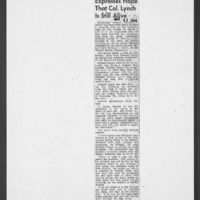Expresses Hope That Co. Lynch Is Still Alive
Item
-
Title
-
Expresses Hope That Co. Lynch Is Still Alive
-
Date Created
-
1944-03-28
-
Creator
-
The Bethlehem globe-times. (Bethlehem, Pa.) 1925-1977
-
Identifier
-
ww2-7948
-
Description
-
Clipping extracted from The Bethlehem globe-times pertaining to WWII military personnel from the Lehigh Valley, part of the BAPL WWII Newspaper Clipping Collection.
-
Digital Format
-
application/pdf
-
Clipping
-
Language
-
English
-
Publisher
-
Bethlehem Area Public Library
-
Contributor
-
Entries added in 2013 funded in part with Federal Library Services and Technology Act (LSTA) funds from the Institute of Museum and Library Services, administered by the Office of Commonwealth Libraries.
-
Date Submitted
-
2013-04-01
-
Type
-
Text
-
content
-
March 28, 1944
Expresses Hope That Co. Lynch Is Still Alive
Lieutenant Colonel Thomas J. Lynch was shot down while strafing a Japanese ship off the northern coast of New Guinea on March 8 and it is not impossible that he may have survived the parachute leap from his plane, Lieutenant General George C. Kenney, commander of the Fifth Air Force, wrote in one of two letters received yesterday by the pilot’s parents, Mr. and Mrs. William J. Lynch, of 426 Walnut Street, Catasauqua.
The second letter, a note of condolence, came from General Douglas MacArthur, Supreme commander of the Southwest Pacific area.
Colonel Lynch, with 20 kills to his credit, was flying a mission with Captain William Bong who circled the area for some time after, the Catasauqua airman left his disabled ship but was unable to tell whether Colonel Lynch had survived the leap into a heavily wooded area.
Colonel Lynch was shot down on the day following his elevation from the rank of major and less than three months after he married the former Rosemary Fullen of Swissvale, Pa., while on a 30-day leave.
General MacArthur’s letter follows: “I cannot express to you the poignancy of my regret at the death of your son. His service under me was characterized by his complete devotion to our country and his noble death impregnates him with it imperishable glory. I have lost a gallant commander-in-arms and with you mourn a splendid gentleman.”
The letter from General Kenney follows: “I have always had the great confidence in Tom as one of the most capable fighter pilots in the theater. Endowed with high courage and leadership, he brought his men through danger to victory on many occasions. His personality and his gallantry in active combat with the enemy, endeared him to all of us.
“There is little I can tell you about the accident. The engine of his airplane was set on fire by the Japanese while he was strafing a ship along the northern coast of New Guinea. He bailed out but it is believed by Captain Bong, who was with him, that his parachute did not have time to open. The captain circled the place where he went down but was unable to see anything, as the country is thickly wooded.
“I do not think it is fair to hold out much hope that he survived the jump, but that is not impossible. If he has, he will have been taken prisoner and you will receive word through the Red Cross.
“Tom was one of the heroes the Fifth Air Force can never forget. We will find it more difficult to carry on without him. But his memory will help those of us who are left to keep up the fight for the things he believed in; the things for which he sacrificed so much.”
